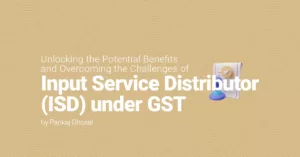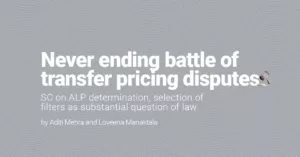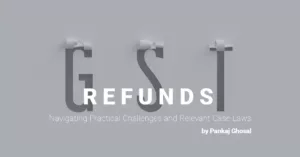The process of an advance ruling might not be new, but it is certainly something which needs to be more effectively used by companies doing business in India. Advance rulings can not only specify beforehand the criteria of tax liability under the GST (Goods and Services Tax) regime before undertaking a certain project, but they can also effectively help companies in avoiding tax litigation in the long run. Advance rulings help to simplify the indirect tax issues for a company doing business in India and allows the company to structure its taxation processes easily.
Advance rulings (ARs) can essentially be undertaken for any sector/industry, involving supply of either goods or services, or a combination of both. The ruling given by the Appellate Authority for Advance Ruling (AAR or AAAR) is essentially valid in the given Indian state where the AAR or AAAR resides, and not in another jurisdiction and ARs obtained are very specific to the assessee filing it and cannot be used by any other assessee, even if for a similar case.
Along the lines of such cases, it was recently where we at Coinmen obtained an advance ruling for a project in the infrastructure space (specifically in the road sector), where an Indo-Spanish joint venture is to undertake a project given out by the National Highway Authority of India (NHAI). The project involved the 6-lane Eastern Peripheral Expressway, on which the installation of the Intelligent Transport System (ITS) and its maintenance were required on the expressway.
Under the purview of ITS, facilities/mechanisms such as the Advanced Traffic Management System (ATMS), Toll Management System (TMS), and Digital Transmission System were to be installed and maintained on the expressway.
In the industry, there is a general sense of ambiguity and confusion about the Goods and Services Tax (GST) rate to be levied on such project, i.e. whether it is 18% or 12%. This ambiguity arises due to certain challenges such as the lack of conclusive evidence regarding the project being a works contract involving immovable property, or not.
Hence, via this advance ruling, we successfully proved how goods and services both were being supplied by the concerned parties and immovable property was involved. Consequently, we received a clarification from the AAR that the GST rate of 12% (6% CGST and 6% sGST) will be applicable on such projects.
In doing so, we did face certain challenges in securing this judgment, some of which are highlighted as follows:
- Regardless of the presence of laws and case findings, it had to be proven conclusively that the said contract is a composite supply of works contract involving immovable property; because there is a general sense of ambiguity regarding the tax rate for such types of projects and contracts.
- It had to be proven that the invoicing process undertaken for the project can (and would) be done on a part-by-part basis rather than milestone invoicing. A similar situation can be analogous to raising a single invoice for installation of an air conditioner which includes the product as well, versus raising a separate invoice for the air conditioner as a product and for the installation work as a service.
The conditions specified above were being fulfilled somehow, but not directly. There was ambiguity and vagueness with respect to the laws in place and the situation, i.e. the type of project being undertaken. Our main goal was to prove the above conditions via case laws, findings, previous ARs obtained, previous judgments, and so on to determine the scope of the legal acts concerned with the matter and bring it to a cohesive conclusion.
The primary grounds of the argument from our side for the advance ruling to be obtained are elucidated as follows – particularly highlighting how we navigated each of the challenges above and fulfilled the requirements to bring the case in favour of the client we represented:
Criterion 1:
The mentioned contract should consist of a “composite supply” of a works contract involving and if it does so, it shall consist of processes such as construction, erection, commissioning, installation, repair and maintenance of a civil structure or immovable property meant to be used for activities other than commerce, industry, or any other business or profession
Solution:
For this criterion to be satisfied, we argued that a composite supply of works contract exists as there is a taxable supply of goods along with some portion of service as well, wherein one of the primary businesses involved in the undertaken is the supply itself.
Criterion 2:
Further, it was deliberated as to how the installation of a traffic system on the highway comes under the bracket of immovable property which will be used for public transportation purposes; specifically as to how it acts as a part of the land resource it’s being upon and is not something which can be easily detached from the said land resource.
Solution:
The project involved the installation of Advanced Traffic Management System (ATMS), Toll Management System (TMS), and Digital Transmission System on the expressway as part of the Intelligent Transport System (ITS). The scope of work also involved the maintenance of the ATMS for a period of 4 years on a turnkey basis.
We also cited the judgement (AR) of a similar case wherein CCTV cameras being installed on road projects are considered to be a part of the immovable property (the road) that they are being installed on and are therefore to be treated under the same purview.
Added to that, the system to be installed by our client will be for public usage in order to provide real-time traffic information, updates on pollution, and so on to the general public.
Furthermore, we argued that with regards to advance rulings and works contract, there is no law set in stone which essentially prohibits part-by-part invoicing or it must be mandatorily invoiced as a single device, which further tilted the ruling in our favor.
On these grounds mentioned above, we effectively argued and obtained the advance ruling for the given project and relaxed the GST from 18% to 12% on the entire project. One of the senior finance officials of the client we represented had the following to say on receipt of the advance ruling:
“It was a pleasant surprise to see that the tax rate could be overturned to a new and more flexible one. However, it wasn’t easy. After a lot of research, Coinmen represented our case successfully and proved conclusively on all the grounds that we make a legitimate case for the advance ruling to be provided, which in turn has helped with our cash flow management as well.
This is an extremely positive move and we thank Coinmen for initiating it, and it has further strengthened our intent to continue to do business in India and bid on new projects in the future as well.”
Although the process was by no means easy, methodical research and a thorough understanding of the sector helped our case. and furthered our efforts to change the business outlook of India for potential as well as existing market players.
Owed to a low tax rate on projects which fulfil the criteria specified, companies in the infrastructure sector can definitely look to avail these benefits and expand their business presence in India.
–
Written by Varun Garg, Sr. Consultant – Financial Accounting Services










